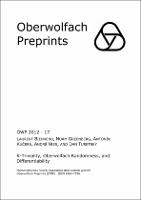| dc.contributor.author | Bienvenu, Laurent | |
| dc.contributor.author | Greenberg, Noam | |
| dc.contributor.author | Kučera, Antonin | |
| dc.contributor.author | Nies, André | |
| dc.contributor.author | Turetsky, Dan | |
| dc.date.accessioned | 2012-12-21T12:00:00Z | |
| dc.date.accessioned | 2016-10-05T14:13:52Z | |
| dc.date.available | 2012-12-21T12:00:00Z | |
| dc.date.available | 2016-10-05T14:13:52Z | |
| dc.date.issued | 2012-12-21 | |
| dc.identifier.uri | http://publications.mfo.de/handle/mfo/1049 | |
| dc.description | Research in Pairs 2012 | en_US |
| dc.description.abstract | We show that a Martin-Lof random set for which the effective version of the Lebesgue density theorem fails computes every $K$-trivial set. Combined with a recent result by Day and Miller, this gives a positive solution to the ML-covering problem (Question 4.6 in Randomness and computability: Open questions. Bull. Symbolic Logic, 12(3):390{410, 2006). On the other hand, we settle stronger variants of the covering problem in the negative. We show that any witness for the solution of the covering problem, namely an incomplete random set which computes all $K$-trivial sets, must be very close to being Turing complete. For example, such a random set must be LR-hard. Similarly, not every $K$-trivial set is computed by the two halves of a random set. The work passes through a notion of randomness which characterises computing K-trivial sets by random sets. This gives a "smart" $K$-trivial set, all randoms from whom this set is computed have to compute all $K$-trivial sets. | en_US |
| dc.language.iso | en | en_US |
| dc.publisher | Mathematisches Forschungsinstitut Oberwolfach | en_US |
| dc.relation.ispartofseries | Oberwolfach Preprints;2012,17 | |
| dc.title | K-Triviality, Oberwolfach randomness, and differentiability | en_US |
| dc.type | Preprint | en_US |
| dc.rights.license | Dieses Dokument darf im Rahmen von § 53 UrhG zum eigenen Gebrauch kostenfrei heruntergeladen, gelesen, gespeichert und ausgedruckt, aber nicht im Internet bereitgestellt oder an Außenstehende weitergegeben werden. | de |
| dc.rights.license | This document may be downloaded, read, stored and printed for your own use within the limits of § 53 UrhG but it may not be distributed via the internet or passed on to external parties. | en |
| dc.identifier.doi | 10.14760/OWP-2012-17 | |
| local.scientificprogram | Research in Pairs 2012 | |
| local.series.id | OWP-2012-17 | |
| dc.identifier.urn | urn:nbn:de:101:1-201212216061 | |
| dc.identifier.ppn | 1651937338 | |

